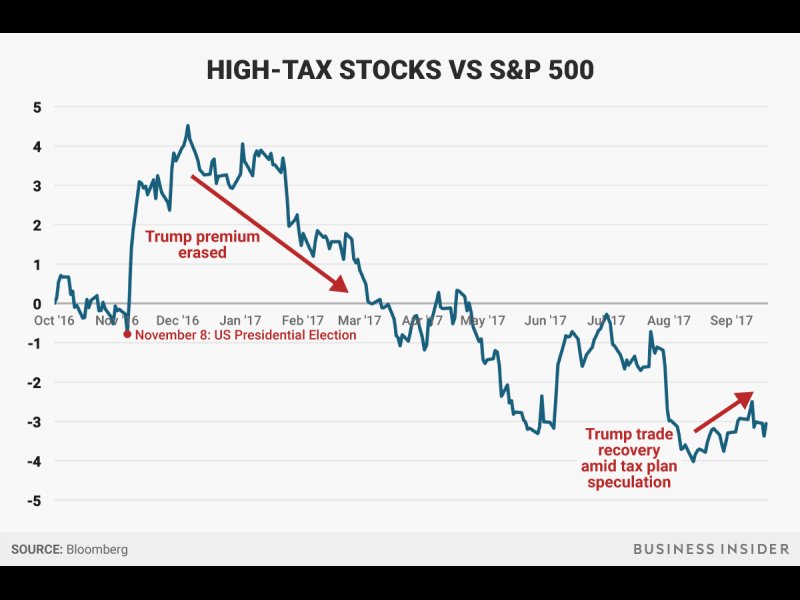Corporations aren't the only ones set to profit from the Republican tax plan that's expected to be released this week.
You can too — if you know where to look.
Just focus on the so-called "Trump trade," which involves betting on the areas of the market poised to benefit most from the pro-business policy overhaul being touted by the president.
Investors have already started piling back into the trade after a long hiatus, as they start to hope for real progress on the policy front.
But don't worry, you haven't missed much yet. If the plan arrives as expected, there's still a great deal of upside potential to be realized, especially since these same Trump-linked strategies retraced all of their post-election gains — and then some — as investors lost confidence in the president's proposed policies.
Here's a quick primer on what matters to investors:
- Though the Trump administration has released outlines of its objectives before, it's way behind schedule in terms of getting a detailed tax cut plan in front of Congress. That is supposed to happen in the coming week — maybe as soon as Monday.
- The key measure investors are focusing on involves a lowering of the corporate tax rate from 35% to somewhere in the 20% range. Trump has pushed for 15% in the past, but that's being increasingly viewed as unviable.
- Another that's being floated is a one-time repatriation tax holiday for companies holding trillions of dollars overseas. They'd be allowed to bring that cash back to the US at a lower than usual rate. It could spur investment in the US, but it's also very likely to wind up being used to pay dividends and buyback shares.
- Another element that investors could trade on is the ability to immediately expense capital expenditures.
The two most straightforward Trump trades involve buying stock in two types of companies: (1) Those that pay the most taxes and (2) Those that hold the most cash overseas. Lucky for you, both Goldman Sachs (NYSE:GS) and JPMorgan (NYSE:JPM) have baskets tracking both groups.
For more detail, here's a breakdown of how those two firms, plus two other Wall Street titans, recommend investors play tax reform:
Goldman Sachs, part 1
Overview: The chart above shows a Goldman-curated basket of 50 companies that pay high taxes, spread across a variety of US industries.
After a post-election surge, the index saw all of its gains relative to the broader market erased by mid-March. Now, amid rising optimism around some sort of tax cut, it's been ticking up in recent weeks.
Top recommendation: Figure out which companies pay the most taxes, then buy their stocks and don't look back.
Goldman Sachs, part 2
Overview: The second big component of the expected tax plan, a repatriation tax holiday, would incentivize multinational companies — who make a large portion of their earnings overseas — to bring cash held internationally back into the US.
The chart above shows another Goldman index containing the stocks with the highest overseas earnings. After losing their post-election gains, they recovered before spiking in recent weeks on increased policy optimism.
Top recommendation: Figure out which companies hold the most cash overseas, then buy their stocks and don't look back.
JPMorgan
Overview: While JPMorgan shares Goldman's view that highly-taxed companies will benefit from the expected tax reform, it's also watching closely for the immediate expensing of capital expenditures (capex). If that were to go into effect, it would benefit asset-heavy industries, most notable energy and industrial companies.
In terms of the previously-mentioned lowering of corporate taxes, JPMorgan estimates that if the statutory tax rate is cut just 10 percentage points to 25%, that would boost the S&P 500's earnings per share by $11.40 to $143.40 — and add more than 150 points to the index, which is fresh off a series of record highs.
And with the stock market serving as a handy signaling device for the likelihood of policies being introduced, JPMorgan also sees areas of the bond market vulnerable to new the repatriation portion of the tax plan.
"Tax reform that repatriates foreign cash and eliminates interest deductibility would greatly reduce US corporate bond supply and should thus on net tighten credit spreads," analysts led by Jan Loeys, the firm's head of global asset allocation, wrote in a recent client note.
Top recommendations:
- Buy stocks of companies paying high taxes
- In the event of immediate capex expensing, buy stocks of companies in asset-heavy sectors like energy and industrials over those in asset-light sectors
- Keep an eye on the potential for tighter credit spreads
